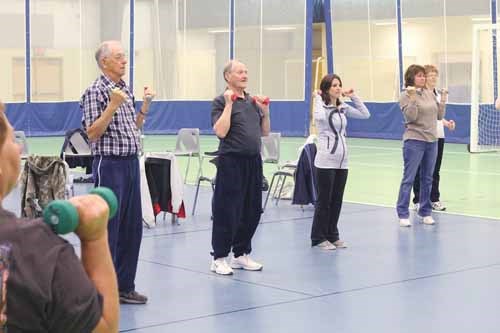The Health Foundation of East Central Saskatchewan showed off the region's new Cardiac Rehabilitation Program to media at an event last Thursday.
Using equipment provided by The Health Foundation and staffing hours paid for by the Ministry of Health, the program has been training at-risk heart patients in exercise and healthy living options since May.
Participating in the program are 20 area residents who have experienced a "heart event" such as a heart attack, valve problems, open-heart bypass, or coronary stent, and patients who exhibit risk symptoms such as high blood pressure or angina.
"We run this program to reduce the risk of further heart events and help them better recover from their heart event, as well," explained Cara Murray, a registered nurse who oversees the program.
The current eight-week session is the second intake of participants since spring. At the program's start, the group is visited by a dietitian, a pharmacist, and other health professionals for education on the lifestyle changes that can reduce their risk of further heart issues. During the remainder of the program, the participants meet two mornings a week for a health checkup, light aerobic exercise, and weightlifting under the supervision of a nurse and an exercise therapist.
Taking part in an exercise program reduces the risk of further heart events for patients by 26 percent.
The program's medical supervision, along with the emergency equipment kept on hand during the sessions, is helpful in making heart patients feel safe enough to take on the exercise they need, said Murray.
"Sometimes after a heart event, people are nervous to start exercising again. They're scared that they might have chest pain, might have another heart event."
Even more important to raising participation levels is the program's close proximity to its subjects. Previously, patients needed to travel to Regina or Saskatoon to join a cardiac rehab program: a drive that few Sunrise Health Region residents were willing to make twice a week.
Yorkton's Len Kennedy is part of the latest eight-week program.
"I've learned a lot of things about diet, and things that I need to be careful with, and just lifestyle changes," he said. "It gives you a commitment too, to exercise more and do the things that will promote a healthy heart."
"You get to meet others that are facing the same experiences and same circumstances that you are," added Kennedy, "and you're not alone in this."
The nurses will perform follow-up assessments with participants after the eight weeks are concluded. It is hoped that most participants will maintain the exercise routines on their own.
The next Cardiac Rehabilitation Program will run in Melville. A doctor or nurse practitioner can refer interested patients into the program.




